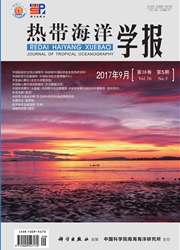

 中文摘要:
中文摘要:
造礁石珊瑚与共生藻Symbiodinium spp.的互利共生对维护多样性极为丰富的珊瑚礁生态系统至关重要。在受到诸如水温异常等环境胁迫时,宿主珊瑚会排出体内共生藻而导致珊瑚白化直至死亡。造礁石珊瑚群体丰富的颜色对于珊瑚适应环境有着重要的作用,即使是同种造礁石珊瑚的不同群体,它们在颜色上也会有差异。丛生盔形珊瑚Galaxea fascicularis作为印度-太平洋区系常见种广泛分布于海南三亚珊瑚礁海域,不同群体的颜色相异。对绿色和褐色2种颜色的丛生盔形珊瑚群体共生藻的28S rDNA进行限制性片段长度多态性(polymerase chain reaction-restriction fragment length polymorphism,PCR-RFLP)分析,结果显示,该珊瑚可以与C和D系群共生藻分别或同时共生。此外,丛生盔形珊瑚2种颜色群体的共生藻组成并无显著差异,表明珊瑚群体的颜色差异与共生藻的组成并无直接联系。影响珊瑚表型颜色的因素复杂,包括珊瑚的绿色荧光蛋白(green?uorescent protein,GFP)、珊瑚和共生藻的各种色素等,具体机理需要进一步研究。
 英文摘要:
英文摘要:
The symbiotic association between corals and Symbiodinium is a major contributing factor in the success of coral reef ecosystem with high biodiversity.Under stressful environmental conditions,such as abnormally high water temperatures,this symbiosis can break down and the zooxanthellae are lost in a process known as "bleaching",which can cause the death of corals if stresses are severe or persistent.Reef-building corals have diverse colors even in different colonies within the same species,and the color plays a key role in acclimation of coral to environment.Galaxea fascicularis is a common reef-building coral in the Indo-Pacific area,including the coral reef areas in Sanya,Hainan Island,and displays a variety colors even with different colonies.The authors used PCR-RFLP to investigate whether or not variation in color is associated with Symbiodin-ium differentiation.The results reveal that G.fascicularis can be associated with Symbiodinium clade C and D either individu-ally or simultaneously.In addition,there is no correlation between the composition of Symbiodinium and the color morphs of the coral G.fascicularis.These results highlight the complexity of coral color such as GFP-like protein of coral and symbiont pigments,and need further research.
 同期刊论文项目
同期刊论文项目
 同项目期刊论文
同项目期刊论文
 Genetic diversity of potentially free-living Symbiodinium in the Xisha Islands, South China Sea: Imp
Genetic diversity of potentially free-living Symbiodinium in the Xisha Islands, South China Sea: Imp Coral community changes in response to a high sedimentation event: a case study in southern Hainan I
Coral community changes in response to a high sedimentation event: a case study in southern Hainan I Low genetic diversity of symbiotic dinoflagellates (Symbiodinium) in scleractinian corals from tropi
Low genetic diversity of symbiotic dinoflagellates (Symbiodinium) in scleractinian corals from tropi 期刊信息
期刊信息
